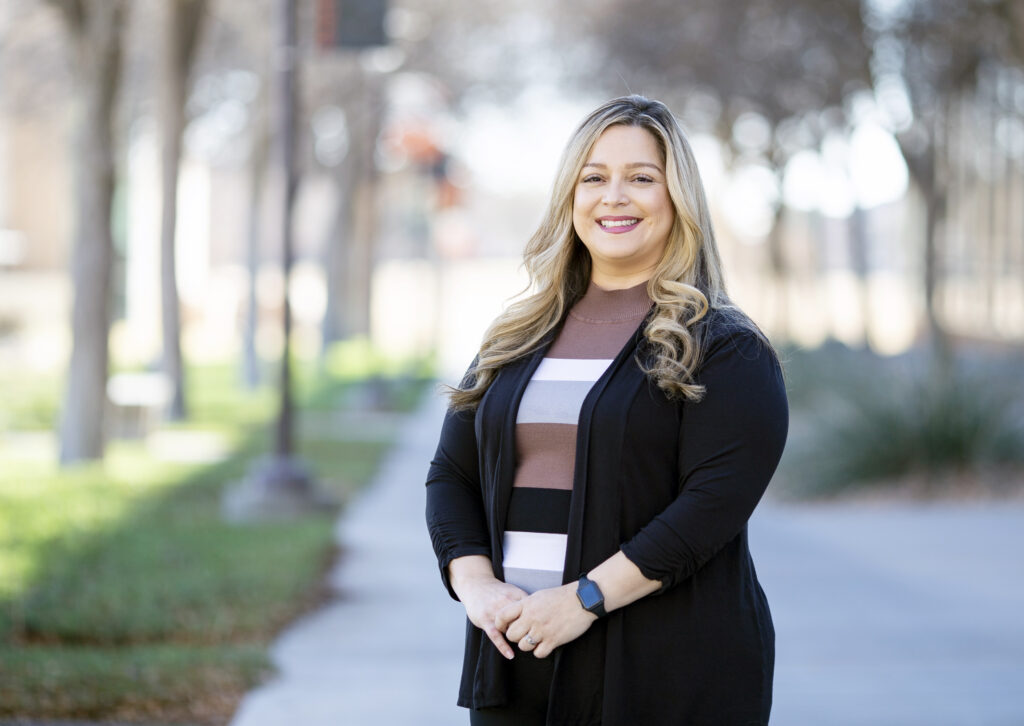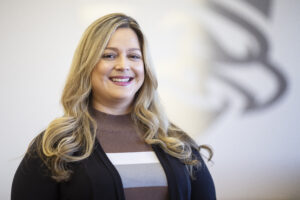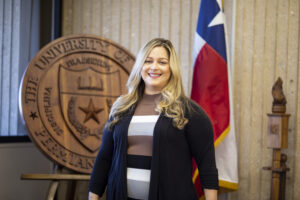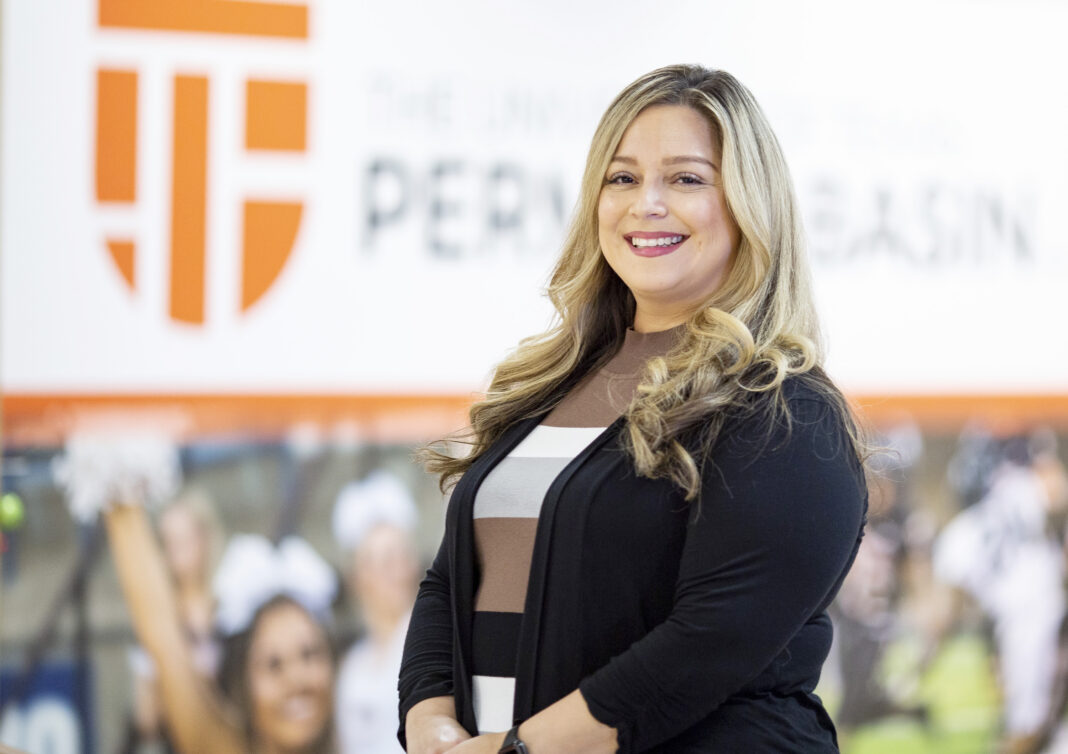Marisol Chriesman willed herself through college and graduate school and is now helping those with similar backgrounds achieve more in their lives.
Chriesman is executive director for advancement services, foundation engagement, and official endowment compliance officer at University of Texas Permian Basin. In January, she will have been with UTPB for three years and is something of an evangelist for higher education.
Growing up in Monahans, it was expected that she would finish high school, find a husband, start having children and maybe have a part-time job.
But Chriesman wanted more. She earned a bachelor’s degree in communication arts with an emphasis in journalism from University of Incarnate Word in San Antonio and a master’s degree in public administration from UTPB.
Chriesman and her husband, Shane, have 9-year-old twin boys, Evan and Aviel. Shane Chriesman is an assistant U.S. Attorney for the Western District of Texas.
Her parents are Rosa Yanez, retired, and Felipe Yanez, who died Nov. 11, 2016.
Chriesman has one younger sister, Maribel Yanez, who is now in college.
“She’s a non-traditional student. She didn’t realize until later on that maybe she should go to college, so she should be graduating in May from UTPB to get her teaching certificate,” Chriesman said.
She added that she would like to think she is the inspiration for her sister going to college.
“I think I pushed her to do it because she was, after high school, kind of just jumping from job to job, struggling for the last few years. I’ve been telling her just go to school … and she started at Odessa College for her associate degree and then transferred here to UTPB, so it’s taken her a little bit longer because she’s working part time. I have definitely been kind of another mom to her … saying just get it done. It’ll be worth it. She has struggled, but she’s getting it done,” Chriesman said.
With Chriesman’s twins, she said they don’t understand that there’s an option not to go to college.
“We do it in a friendly, appropriate way that’s not demanding; that’s not you will go, because one of my boys is not a huge fan of school and he will ask me why do people have to go to school and we have to go through this whole conversation. I tell him you still have eight years of school to finish high school and then four more years of college and two years of graduate (school). And he’s like, oh my gosh, we’re going to be in school forever.”
“So we talk about it; about where they’re going to go. If their grades aren’t great, that’s not going to get you into a top college, so start thinking of what your goals are. They have an option, absolutely, because I will support them but at this time they are going to college,” she said.

For her part, Chriesman said she didn’t know what college was until fourth grade. Her parents were from Mexico, so Spanish was her first language. She started prekindergarten in an English as a second language class.
“… I was already kind of written off, and then in third grade I got lucky to get this wonderful teacher … who just saw something in me. I would always get good grades. … Thinking back, I don’t know how because nobody helped me with homework. My parents couldn’t read English at the time. She saw something in me and she took me aside and said I really think you need to be in the gifted and talented next year; the GT classes. … I told her I don’t think so. I don’t think my mom’s going to let me and she said let me talk to her and they sent permission forms home. It was new and scary and she said no. We can’t afford it, not understanding what the program was. I said, ‘Mom, please. It will change my school and education.’ So I remember her pulling over upset because I was being stubborn as I usually am. She said just give it to me, but if we have to pay anything more I can’t afford it. I said it’s fine. We’ll figure it out. … She signed it and I got into GT in the fourth grade … and that’s when I met my best friends. That’s what changed my life,” Chriesman said.
One day, they had spirit day where everyone was asked to wear shirts from the colleges they liked.
“I remember the two biggest schools that most everyone was wearing were UT Austin, the Longhorns, and Texas Tech. I never said anything. I just thought OK, all right. Then the teachers started talking about why it’s important to go to school and get good grades and that’s why these GT classes are so important. That’s when I really started hearing about it; started doing better in school; in junior high, getting involved in more UIL activities, extracurricular sports. That’s when I started looking into what does college do for you? What does that bachelor’s degree do for you?”
She remembers telling her mother that she had to go to college because she didn’t want to live paycheck to paycheck.
“I remember, I said you … have done the best for us, but I don’t want to live like that. And they were just scared. They were terrified of me leaving the house and to move away because I said I want to move. I don’t want to stay here and she said, ‘Why don’t you just go to Odessa College, get certification to be a secretary.’ I said no. I want something more. I want something bigger and that really was one of our biggest fights in high school.”
She told her mother she was leaving for school and her mother told Chriesman she was on her own.
“I said it’s fine. I’ll figure it out, and I did and in hindsight I think back at 17, 18 years old, I don’t know how. I did it by myself, but I did apply for colleges; FASFA. I was working. I’ve been working since … I was like 13 or 14 years old; filing taxes at 17, 18 years old by myself. I just didn’t know any better. I didn’t know that there was help, or that I could ask for help.”
It took Chriesman five years to finish her undergraduate degree because she was working so much. She said she is still paying off her undergraduate degree, but her husband supported her through her master’s.
She wasn’t able to get the good grades during undergraduate school she was used to.
“… It was a different world (being in college). … There was so much coming against me. I had a high school sweetheart that I’d had since my sophomore year in high school and everyone assumed we were going to get married and my mom and dad (said) that’s who she’s going to marry. I was leaving for college no matter what. I started college and he said you need to drop out of school. I’ll support it. And I said no; I’m not dropping out and we broke up because of that and so I lost him,” she said. “I thought oh my gosh what did I just do? But that was more important to me. I knew; I knew that if I wanted to have the life I had thought I wanted, or knew I needed, I needed to finish. …”
She didn’t know what she wanted to be when she got older. Chriesman just knew she had to get her degree.
“That’s as far as the plan got. If I knew then what I know now, would my life choices and career choices have been different; probably, but it’s been great. Everything has lined up great for me and my family,” she said.

She added that she didn’t plan any of her jobs out.
“I’ve had some amazing jobs. Prior to this, I was the executive director for Harmony Home Children’s Advocacy Center where I got to work with abused kids and our local law enforcement and our prosecution team. That was a wonderful experience and so I never thought of being in higher education. When I was going to school for my master’s, sometimes I’d be up late because my kids were smaller and I’d do assignments in the evening or nighttime. I just was looking one day (and) saw this job and thought oh they’ll never call me. Again, there’s that insecurity because it’s our culture; my culture; my family. We’re kind of brought up to just be quiet and kind of stay in our lane and not pursue too much. So my first thought was oh they’ll never call me,” Chriesman said.
But they did.
“… They called me right away and I have enjoyed it so much because I am able to create new scholarships from funds that donors provide for our students and that is the hardest thing about college. I mean, yes, the school portion is hard. …,” but paying for it also is difficult.
She said things have come full circle for her.
“… I’ve fought so hard to go to college and now I’m working at a university. It’s fun for me to say now here I am working at a higher education setting and it kind of helps me back up what I preach to my family. I have so many cousins and they have kids, so we have a lot of small kids in our family. A lot of them were at my graduation because I walked the stage. …
“We had a little celebration after and my cousins took their kids and I talked to them about why it’s important and why I hope to see them all go through the same path, but easier; that I will help them however they need …,” she said.
Chriesman said she doesn’t get to see students in her office as much as she would like, but they do get thank-you letters to donors from the students.
“… This money is life-changing for them. Some of the stories, especially with COVID last year … and some of our student emergency funds, it has allowed them to actually graduate and go on to the workforce. That to me is very fulfilling. It’s just been kind of full circle where I think if I would have known all this when I was in college, it would have been so much easier. But it all happened for a reason and I think that’s why I’m so motivated here to make some change happen, raise those funds, write those grants, make sure we’re in compliance with our endowment, grow our numbers of endowments, and have good relations with our donors and constituents …,” Chriesman said.
She said there are so many people in the community that are supportive.
“… Being able to tell our students’ stories and to have students tell their own stories; that’s the best part,” Chriesman added.
She also walks friends through the application process because she wants their children to be successful.
“I’ve encouraged friends my age to go back to school and they go for it. People know me to be very helpful, not just for education but in anything that I can … so it’s amazing to be able to help our students. We blast it as much as we can and I post in on my social media and it just opens up a lot of doors and opportunities, money that they didn’t know they had access to because there is a lot of funding available for students and students need to realize that,” Chriesman said.

She added that they can get aid from universities, third-party scholarships and from other sources.
Vice President of Advancement Wendell Snodgrass said Chriesman has a passion for helping others.
“She works tirelessly to find ways to help students attain their college degree. We are grateful Marisol chose to work for UT Permian Basin and advance our mission. She has accomplished a lot in three years. With her work ethic and desire to succeed, it will be exciting to see all that she accomplishes in the future,” Snodgrass said in an email.
Chief of Staff/Executive Director of Communication Tatum Hubbard said Chriesman is a “rock star” around UTPB and a great team member.
“Her story is one that I think really resonates with so many of our Falcon family …,” Hubbard said. “… She’s exceptional.”
She is an example not only for the young people she speaks to, but adults as well.
“One of the things we try to do around here a lot is keep a mental picture of the students we’re serving. I think when you do that, you can stay pretty focused and you can make some value judgments. I like to picture what was Marisol’s journey to go to college? What help did she need along the way, whether through the admissions process, with financial aid, with advising; just with life issues that came up. So because we know Marisol and we know her journey, we also know how to better serve our students. I think that’s helpful to have a real mental picture about what one of our students, what their life might be like,” Hubbard said.
Chriesman had to figure out a lot of things on her own.
“That’s not unlike so many of our students. Applying for college is sometimes not that easy. It can be a complicated process and I say that having just done so for my own daughter and I did go to college. I work at a college and it was still difficult. Now I try to think about what if nobody in my family had ever been down that path before? … We have a lot of students who are figuring things out on the go and I’m so proud of them for that,” she said.
“It’s incumbent upon us to be really helpful along the way and really patient, allow lots of good questions and then dig around until we can find some answers that make their lives easier and help them reach their goal,” Hubbard added.




